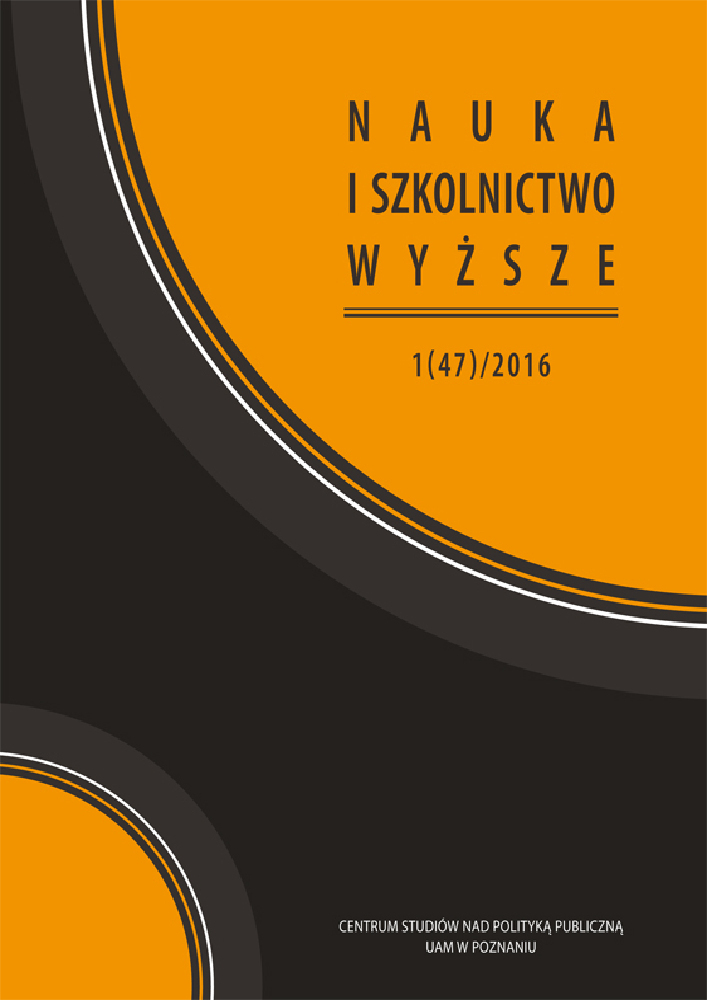Abstract
Mobilization is a key for any modernization attempt. It was true also for rebuilding of Poland after 1945 and designing a new socialist university. Taking as a starting point the social revolution argument, interpreting the WWII and postwar time as a period of profound change of Polish society, I assume that this change brought a deep reconstruction of social imaginary and creation of educational desires among working classes. A conceptual horizon undergone irreversible shift. A common understating, personal expectations, ideal types as well as knowledge about our relation towards the world and other social groups went trough a profound revisions in a result of both the war and the postwar reconstruction. What was a role of universities in this new constellation of meanings? What duties and privileges were assigned to professors, students, working classes in daily press? The article offers an analysis of postwar media not as a propaganda tool, but a medium which reconstructed meanings. Educational desires evoked, horizons of expectations widened for those who never before could imagine enrolling to university.
References
Anderson, B., O’Gorman R. (1997). Wspólnoty wyobrażone: rozważania o źródłach i rozprzestrzenianiu się nacjonalizmu. Kraków: Znak.
Bell, A. (1991). The Language of News Media. Oxford: Blackwell.
Bińko, B. (2001). Skąd przychodzili, dokąd zmierzali... aspiranci pierwszego rocznika Instytutu Kształcenia Kadr Naukowych przy KC PZPR. W: T. Szarot (red.). Komunizm: ideologia, system, ludzie. Warszawa: Neriton.
Curry, J.L. (1990). Poland’s Journalists: Professionalism and Politics. Soviet and East European Studies 66. Cambridge - New York: Cambridge University Press.
Garbowski, Ch. (2012). Imaginarium w kulturze popularnej. W: J.P. Hudzik, J . Kłos, Ch.
Garbowski (red.). Charlesa Taylora wizja nowoczesności: rekonstrukcje i interpretacje. Warszawa: Oficyna Wydawnicza Łośgraf.
Grabham, E., Cooper, D., Krishnadas, J., Herman, D. (2008). Intersectionality and Beyond: Law, Power and the Politics of Location. London - New York: Routledge.
Howarth, D.R., Norval, A.J., Stavrakakis Y. (2000). Discourse Theory and Political Analysis: Identities, Hegemonies, and Social Change. Manchester - New York: Manchester University Press.
Kochanowicz, J . (2000). ZMP w terenie: stalinowska próba modernizacji opornej rzeczywistości. Warszawa: Trio.
Leder, A. (2014). Prześniona rewolucja. Ćwiczenie z logiki historycznej. Warszawa: Wyd. Krytyki Politycznej.
Mautner, G. (2010). Language and the Market Society: Critical Reflections on Discourse and Dominance. London: Routledge.
Narodowy Plebiscyt Pokoju PKF 22/51. b.d. Repozytorium Cyfrowe Filmoteki Narodowej. http://www.repozytorium.fn.org.pl/?q=pl/node/7846 [11.09.2016].
Nowak, W.M. (2008). Spór o nowoczesność w poglądach Charlesa Taylora i Alasdaira MacIntyre’a: analiza krytyczna. Rzeszów: Wyd. Uniwersytetu Rzeszowskiego.
Piskała, K., Zysiak, A. (2013). Świątynia nauki, fundament demokracji czy fabryka specjalistów?
Praktyka Teoretyczna, 3(9), http://www.praktykateoretyczna.pl/PT_nr9_2013_Po_kapitalizmie/11.Piskala,Zysiak.pdf [11.09.2016].
Spodenkiewicz, P. (2008). Sprawa Marii Tyrankiewiczówny. W: J . Żelazko (red.). Rok 1945 w Łodzi: studia i szkice. Łódź: IPN.
Szczepański, J . (1963). Socjologiczne zagadnienia wyższego wykształcenia. Warszawa: PWN.
Taylor, Ch. (2004). Modern Social Imaginaries. Durham: Duke University Press.
Taylor, Ch. (2007). A Secular Age. Cambridge, Mass: Belknap Press of Harvard University Press.
Taylor, Ch. (2010). Nowoczesne imaginaria społeczne. Kraków: Znak.
Taylor, Ch. (2012). Źródła podmiotowości: narodziny tożsamości nowoczesnej. Tłum. M. Gruszczyński. Warszawa: Wyd. Naukowe PWN.
Zysiak, A. (2015). Science for Modernization: Between a Captive and Egalitarian University - The University of Lodz, 1945-1952. Science in Context. 28 (2): 215-236.
